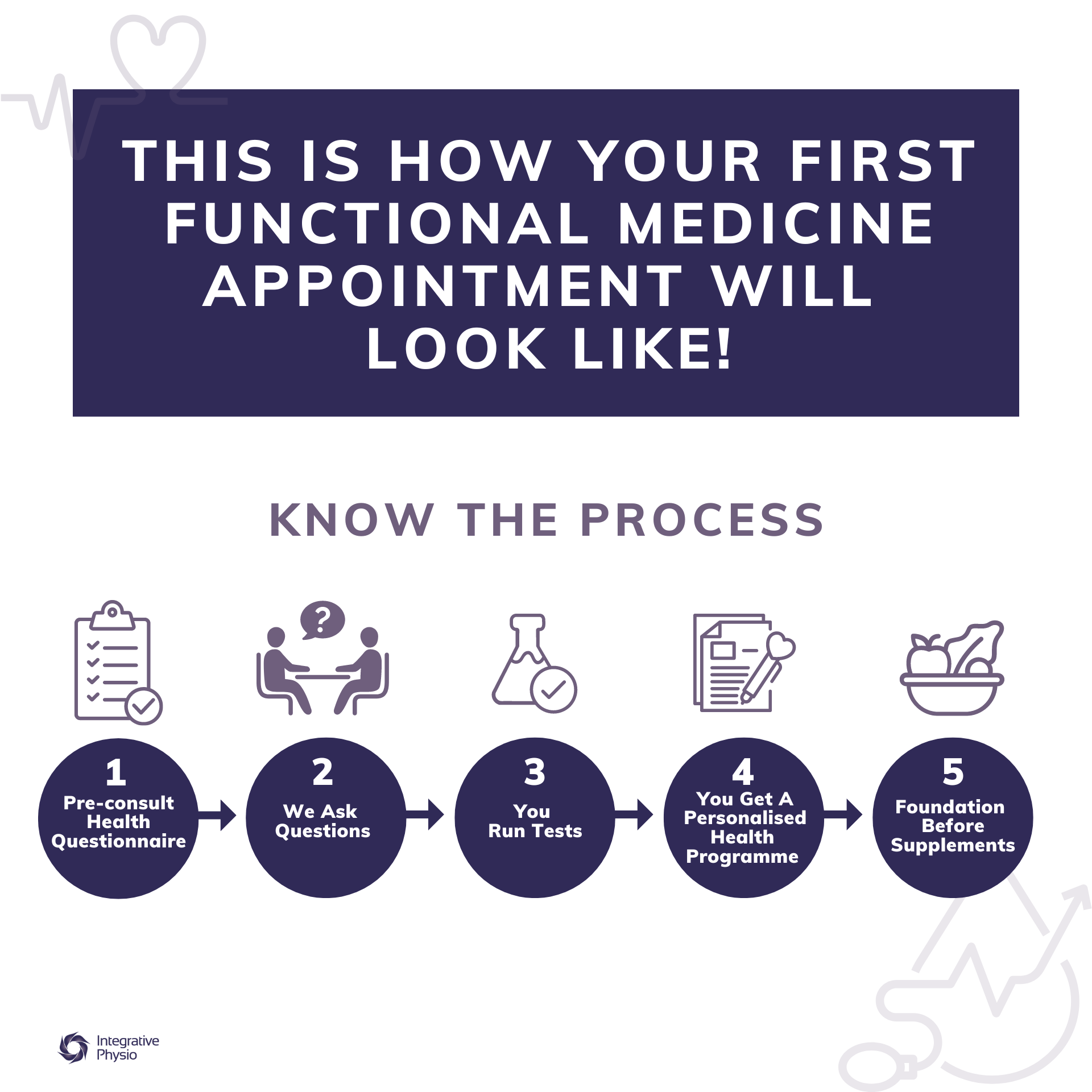What should you expect from a functional medicine appointment?
In the previous article, we discussed functional medicine as a unique form of health practice renowned for its patient-centered, investigative, and holistic approach to resolving health issues.
Beyond orderly procedures in applying the principles of functional medicine, the experience and skills of the practitioner are instrumental to a worthwhile experience for both the client and practitioner. So, if you decide to embark on your journey to good health and book an appointment with us, what are some things to expect from a functional medicine appointment? What happens in a functional medicine consultation? Read on to find out.
We Ask Questions
The comprehensive, patient-centered, investigatory approach of functional medicine is apparent from the very first step. We ask questions! What does this mean? First off, we need to know if functional medicine really is an option for you. While functional medicine yields positive results for chronic disorders and for preventative health care, it is an investment in time, finance and commitment to making changes. Typically one of our clinic practitioners would have had an initial discussion with you and deem your situation to be suited to functional medicine and would then refer you. Alternatively, our functional medicine practitioner may have a brief call with you to assess your suitability. If both you and our practitioner feel functional medicine is the way forward, you can schedule an appointment.
Some people may bypass the screening step above for different reasons, but the next step is compulsory and reveals to both yourself and the practitioner whether you will be engaged enough for functional medicine to benefit you.
You will be required to fill out an in-depth health questionnaire prior to your first appointment. Its content comprises questions about your current health symptoms, your medical history, dietary, exercise and other lifestyle habits, a timeline of significant life events including stressors and trauma from childhood to present day, and your family's medical history if known. However intrusive and cumbersome, all these questions may seem, they are not without reason. You are also required to send in a copy of results of any previous tests you have done with your medical doctors or other health practitioners. The information you provide and the results of past tests will then be reviewed and analysed by our functional medicine practitioner to form the big picture of what may have led to your current state of health. This pre-consultation collection of health and life history also helps the practitioner to hone the consultation in a more specific direction when she meets you. Due to the nature of such a questionnaire, it is advised that you take time to fill it out thoroughly..
You Run Tests
During the first consultation, the practitioner will discuss the possible underlying causes to your health issues and you may be asked to run relevant tests. These may range from conventional medical tests to specialised functional ones. These are geared at gaining further insights into, clarifying or confirming suspected risks, triggers and drivers of your disorders. Whether these tests are covered by health insurance depends on the scope of insurance policy you hold. Please check with your insurance provider.
The types of tests carried out generally entail the following:
Stool tests: The gastrointestinal system is implicated in many chronic disorders. It is also an important factor affecting overall health. Therefore, gut (and stool) health is one of the major things functional medicine assesses. This test gives an insight into possible overgrowth of bacteria, viruses, yeasts and parasites, possible inflammation, and the degree of digestion and absorption, among other dietary and metabolic factors.
Blood Tests: These may be blood samples drawn at your doctor’s office or finger prick blood spot samples carried out at home. Besides the conventional medical tests, blood can be used to test for immune reactivities like food sensitivities and essential fatty acids balance, for example. Some DNA tests utilise blood samples, others use buccal swabs.
Urine Tests: Urine tests give insight into a plethora of variables in the human body. They may give an insight into the interplay between the production of different hormones, neurotransmitters and how imbalances may contribute to illness. Organic acids are assessed through urine tests. They give information on certain nutrients status like B and C vitamins and the functioning of the cell energy production cycle. Certain patterns in the markers of organic acids alert the practitioner to specific potential drivers of chronic conditions, for example fungal or mould overgrowth and toxicities. Toxicities from exposure to chemicals may also be assessed via urine testing.
The process of testing to getting the results may take a few days to some weeks. This is because most of these tests are not available locally. In some instances, they may be quite costly, so you may have to save up for them or if more than one test is relevant for you, you may need to prioritise. Our functional medicine practitioner will explain why specific tests are recommended for you and help you to prioritise. The results will be reviewed and discussed with you at the next follow-up visit. Adjustments and new recommendations to your health programmes will be made as well.
You Get A Personalised Health Programme
The beauty of functional medicine is that it recognises there is no one size fits all programme. You, the patient, are a unique individual with your unique genetic make-up, unique life experiences and environmental exposures - positive and negative. And your current diet, lifestyle, family and work situation pose specific parameters that require both you and the functional medicine practitioner to come up with a set of agreed changes.
The dynamic, two-way approach of functional medicine requires you to be ready to make changes to your diet and lifestyle which may be out of your comfort zone, put in as much effort as possible in carrying out your agreed programme and to be committed to keep going even if at times you can’t be 100 percent compliant. The practitioner in turn is there to listen, no matter how strange certain symptoms may seem, and to help you navigate the complexities of your health condition. She will tweak and adjust your programme at each follow-up visit, to take into account new test results and new feedback from you on difficulties or stages of progress.
Foundation Before Supplements
While the use of nutritional and specialised supplements are used in functional medicine, the first and most important steps to implement are changes to dietary and lifestyle habits.
Bad eating habits are implicated in many chronic diseases. In the same vein, eating the foods that are correct for you at this particular stage of your life, is necessary for the nutrients to support the proper functioning of biological processes in your body’s systems.
At the initial consultation, the functional medicine practitioner will discuss and recommend an overall clean-up of your diet that is immediately necessary even before new tests are carried out.
She will also recommend changes to key lifestyle habits like exercise/movement, sleep habits, sunlight exposure, amount of blue light exposure and if necessary simple stress management techniques.
These recommendations may be broad guidelines if you are already quite clued in. Otherwise they may be specific steps to fit in with your unique work-family-life situation. For example, if you asked to avoid certain foods, what can you replace them with and where can you find these foods and suggestions to incorporate them into your meals. There could be emphasis on how to eat to optimise your digestion or timings.
For lifestyle changes, you may get pointers on how to shift your sleep patterns, how to reset your circadian rhythm and how to schedule in time for sunlight exposure.
If there are environmental exposures that are obviously detrimental to your health, you may get a recommendation to remediate it immediately, for example, getting a mould inspection done.
How much is in the programme will be based on a shared decision and you will receive your agreed programme within a day after the initial consultation.
It is important to realise diet and lifestyle changes are foundations to healing. Getting these in place may often improve your symptoms and help supplements work better or reduce the amount or dosage of medications or supplements you are taking.
Supplements when recommended are again specific to your needs. If you are already taking supplements, the practitioner will usually review them and recommend which you can continue with and which you could stop. New supplements are typically brought in at the follow-up visit especially if there are new test results to guide their requirements.
If you are on medication from your medical professionals, the functional medicine practitioner will need to know what they are so that she can ensure any supplements recommended are not interfering with how the medication works.
Conclusion
Our functional medicine practitioner, Josephine Ng, has been helping people with various chronic illnesses for more than 15 years and has a clientele both in Singapore and abroad. She is a registered Nutritional Therapist, a certified DNALife Practitioner, and a member of the British Association for Nutrition and Lifestyle Medicine and the Institute for Functional Medicine. Your session will be worthwhile because of her expertise and excellent work ethic.
Are you ready for a functional medicine consultation? Book one with us right away. Our staff members are pleased to walk you through the procedure and go through your available appointment-type selections. Also, to learn more about functional medicine and how it can help you, click here.









